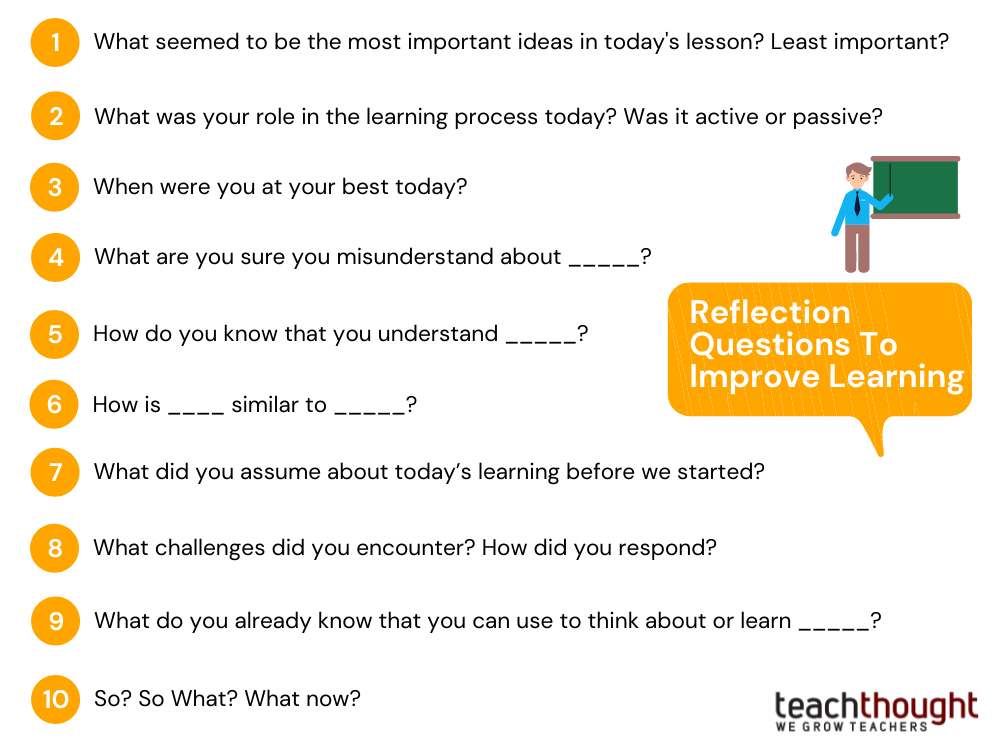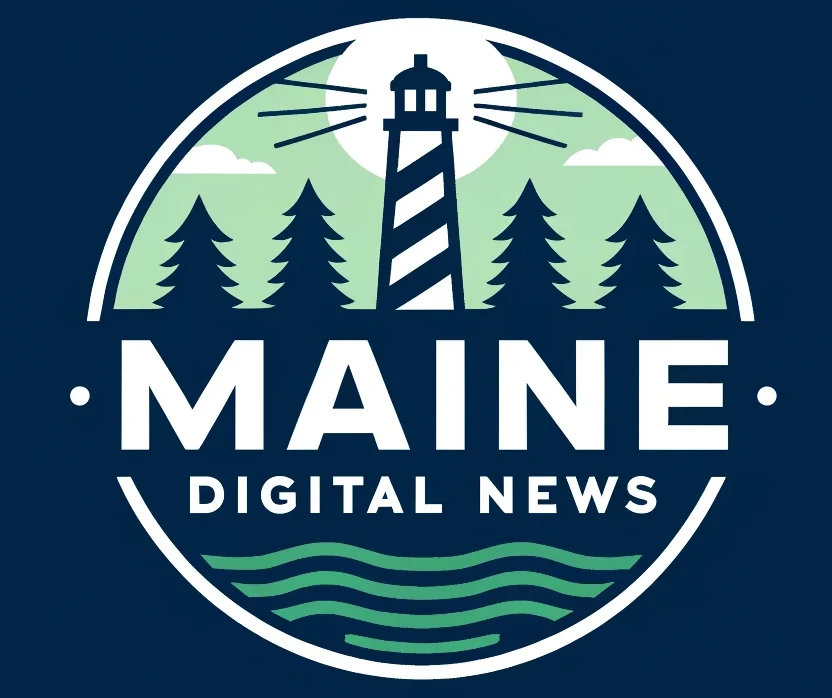

by Terry Heick
A few years ago, I wrote about Types of Learning Journals and reflection was a part of this thinking.
I’ve also shared a small collection of basic reflective questions in the past that could be used as a tweet or other social media post.
Now, for an updated post, I’ve collected many of these questions into a single post that you can sift through and hopefully find something you can use in your classroom tomorrow. Some are questions while others are question stems that can be used to guide reflection in specific lessons or scenarios where unique language or ideas are needed.
See also 12 Authentic Starting Points For Learning
Reflection Questions For Learning
1. What do you remember about what you learned today? Write down as many things as you can in 30/60/90 seconds.
2. Of what you remember, what seemed to be the most important ideas? Write down 3-5 things in bullet-point format.
3. What was your role in the learning process today? Did you find any new information? Interpret it? Attempt to ‘remember’ it? Complete a task? Listen? Watch? Skim? Try? Combine? Consider? Evaluate? Calculate? List? Describe? Problem solve? Recall? Create?
4. Were you an active or a passive learner? Did the learning activity allow (or force) you to be one or the other (active versus passive)?
5. What did you notice others doing during today’s lesson? Include other students, the teacher, etc. Infer cognitive behaviors (what they were doing ‘in their minds’) and listing physical and observable behaviors.
Metacognitive Questions For Learning
6. When were you at your best today?
7. What opportunities did you have today? Which were worthy of your attention, energy, or best thinking? Did you take them?
8. What did you assume about today’s learning before we started? How did that affect your learning (for better or for worse)?
9. What was your mindset before, during, and after the lesson?
10. What are you sure you understand about _____?
11. What do you think you might understand about _____?
12. What are you sure you misunderstand about _____? What is the most likely source of the confusion?
Nature Of Knowledge Reflective Questions
13. What do you suspect that you might misunderstand about ____?
14. What is the difference between misunderstanding and not yet knowing?
15. What do you already know that you can use to think about or learn _____?
16. How do you know that you understand _____?
17. How do you know that you don’t understand ______?
18. How did you respond when struggled with today (if you did)?
19. What did you find most surprising about _____?
20. How did your understanding of _______ change today?
21. Of what you learned, how much of it was new, and how much of it have you seen before?
22. What about _____ makes you curious?
23. How is ____ similar to _____?
24. How does what you learned relate to what you already knew?
25. So? So What? What now? (Summarize what you learned, roughly explain its significance, and estimate what you might/could/should do next in response.)
Bonus: Consider the ‘form’ of learning you used. What other forms could have been used and what would effect might the use of those other forms have had on your learning? Think of sitting and listening versus standing and speaking. Think working alone versus working with others or watching a video versus reading a book versus listening to a podcast. How might the nature of what you learn (the topic or skill or concept being learned) dictate the ideal learning form?
Put another way, how does the learning content and/or goal affect the best learning methods?
Learning Reflection Questions For Students
Also, I previously created questions students can ask themselves before, during, and after learning to improve their thinking, retention, and metacognition. A few highlights from the ‘after learning’ (which qualify them as reflective questions for learning) include:
1. How did that go?
What did I clearly learn? What might I have learned or practiced or improved my understanding of that may not be obvious?
What was most interesting? Least? How can I learn new things if I’m not ‘interested in’ what I’m learning? What do others do in these cases to learn?
What was clear, what was confusing, and what was somewhere in the middle? What do I still need help with? Who can I talk to about the lesson to review key ideas or clarify misunderstandings?
2. What seems most important about what was learned?
What seems less important and what seems more important about what was learned? Or is this something where what was learned doesn’t have a clear hierarchy?
After the lesson, is what seems most important different from how things seemed before and during the lesson? How and why?
3. What should I do with what I’ve learned and how should I respond to what I didn’t learn?
What should I do with what I learned and know? What will I be able to do with this–both now and if and when I improve my understanding of it?
Who should I ‘tell’ or share this with? Who would care and/or benefit the most?
4. What might we learn tomorrow Based on what we learned today?
Where does what we’re learning seem to be ‘heading’? What happens next when we’ve learned things like this in the past?
What could I learn about this tomorrow with help? By myself? What might someone who knows this better than I do ‘learn next’?
5. How have I been changed by what I’ve learned?
How do I feel about this content? Interested? Enthusiastic? Curious? Bored? Indifferent?
How else could I learn this–maybe better? How might I think of this learning in 40 days? 40 weeks? 40 months? 40 years?
More Questions To Reflect On Learning
1. What is the most important concept, skill, or ‘thing’ you learned today, and why do you think it stands out to you?
2. How can you apply what you learned today to your everyday life or future studies? Provide a specific example.
3. What part of the lesson or activity did you find most challenging, and how did you overcome that challenge?
4. Describe a moment during the lesson or activity when you felt confused or unsure. How did you resolve that confusion?
5. How did today’s lesson connect to something you already knew? Did it change or enhance your understanding in any way?
6. What questions do you still have about the topic, and where might you find the answers?
7. In what ways did today’s lesson or activity help you understand a real-world issue or problem?
8. Reflect on your participation today. How did you contribute to the lesson or activity, and what could you do differently next time to improve?
9. What feedback would you give the teacher about this lesson or activity? What worked well for you, and what could be improved or make things clearer, interesting, etc.
Powerful Questions To Help Students Reflect On Their Learning

